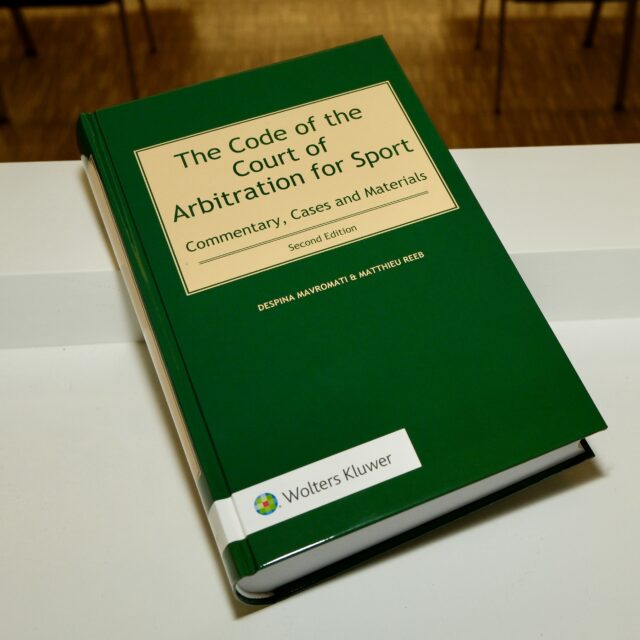4A_170/2023 of 28 June 2023 FIFA v. Yves-Jean Bart, motion to set aside the CAS award TAS 2021/A/7661
This is the SFT judgment which put an end to the disciplinary proceedings initiated by FIFA against the Haitian Football Federation President Yves-Jean Bart for allegations of sexual abuse vis-à-vis several female players of the national technical center.
Following several articles alleging that Yves-Jean Bart had committed acts of sexual abuse vis-à-vis several female players of the national technical center, the FIFA Ethics Commission opened a preliminary investigation, concluding that the Yves-Jean Bart had violated several provisions of the FIFA Ethics Code against minor female football players, threatening witnesses and victims by abusing his position within the Federation. Shortly afterwards, the state courts in Yves-Jean Bart’s home country had cleared him of any wrongdoing for lack of sufficient evidence; however the FIFA Ethics Commission sanctioned him for several violations of the FIFA Code of Ethics, imposing a ban from any activity linked to football and a fine of CHF 1 mio (the FIFA Decision).
In the subsequent appeal to the CAS, the three-member panel heard more than twenty witnesses, some of them under a specific regime in order to protect their identity. The CAS panel issued its award and annulled the FIFA Decision, holding that FIFA could not establish its allegations to the applicable standard of proof (comfortable satisfaction). More specifically, the documents established by various organizations could not constitute sufficient evidence and there was a lack of coherence or credibility in the witness testimony by the alleged victims during the hearing. Additionally, the CAS panel noted that the state authorities had dropped the proceedings against the Respondent for lack of evidence.

In a rather unusual procedural move, FIFA filed a motion to set aside the CAS award in March 2023. The motion was swiftly dismissed by the SFT, which first noted that it is bound by the facts established by the CAS panel and FIFA could not present its own version of factual and procedural circumstances
In essence, FIFA invoked a violation of its right to be heard by the CAS panel for refusing to hear one of the victims even though it had considered necessary to protect the anonymity of the alleged victims and witnesses. The CAS panel held that online hearing platform did not dispose a voice distortion mechanism and suggested to hear the witnesses in a secret place in Switzerland, through a phone equipped with a voice distortion mechanism. FIFA therefore accused the panel of not having an online hearing platform which could enable the witnesses to provide their testimony, as several witnesses could not physically travel to Switzerland for reasons beyond their will. According to FIFA, this led to the failure to hear several witnesses, including a specific person whose testimony could be decisive for the outcome of the case. FIFA supported that it had already raised this procedural deficiency at the outset of the hearing but the CAS panel ignored its request and equally refused to allow written testimony from these persons.
The SFT considered that FIFA had not validly and explicitly raised an objection to the modalities of the hearing and the hearing of witnesses: accordingly, FIFA had only said that it was “rather regrettable” (“plutôt regrettable”) or “unfortunate” that the CAS online hearing system cannot guarantee the protection of witnesses but failed to file an explicit objection in this respect. What is more, at the end of the hearing FIFA confirmed that its right to be heard was totally respected. The SFT held therefore that FIFA’s request was inadmissible at this stage but it also held that such plea would have in any event been dismissed: the panel did not refuse to hear the witnesses but rather suggested an alternative hearing mode of such witnesses.
FIFA also invoked a violation of its right to be heard as the panel had refused its request to produce the unredacted declarations made by the various respondents, which would have shown that their declarations were coherent and credible. Apart from finding this plea inadmissible (for not having invoked such plea before the federal proceedings), the SFT considered such plea as unfounded: the CAS panel had indeed requested FIFA to produce (for the panel only) the entire file of the FIFA proceedings, which de facto included the unredacted declarations; had FIFA wished to draw the panel’s attention to a specific element of the file, it should have done so at an earlier stage and not wait until the end of the CAS proceedings to raise such objection.
Finally, FIFA invoked a violation of public policy due to the impossibility to hear the protected witnesses and specifically one witness through video conference disposing a voice distortion mechanism. The SFT held that the impossibility to hear witnesses online does not infringe public policy, all the more since such possibility does not exist by law in several countries, including Switzerland (even though an amendment of art. 170a of the Swiss Code of Civil Procedure is currently underway, cf. at 6.2.1).
Overall, this was an expected outcome of FIFA’s motion to set aside the CAS award: the SFT stressed the importance of explicitly raising a procedural objection in a timely manner, but also held that there is (currently) no statutory obligation to hear witnesses through video conference. In any event, the efficient protection of the identity of witnesses in similar cases remains a very sensitive issue that could be crucial for the outcome of the proceedings








